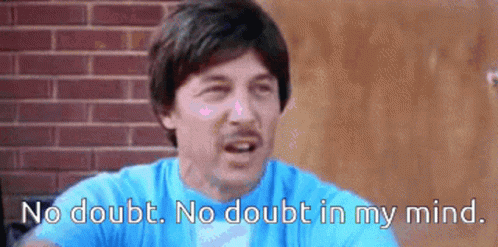The disease that kills dreams—Rich Roll and Uncle Rico—Self-serving bias
Uncle Rico: Yeah... Coach woulda put me in fourth quarter, we woulda been state champions. No doubt. No doubt in my mind.
You better believe things woulda been different. I’d a gone pro. In a heartbeat. I’d be making millions of dollars and living in a… big ole mansion somewhere.
—Napoleon Dynamite (2004)

Coulda Gone Pro
I have always been a below average swimmer. Below average is the term you use when you really mean absolute trash—but want to maintain a veneer of professionalism. (Veneer of professionalism: like when you ask someone what they think about your thing, and they start with, "Well....").
I’m an absolute trash swimmer. The problem is that after I run my marathon in October, I want to consider competing in triathlons. For some hopefully-not-pathological reason. And obviously, triathlons have a swimming component.
Now, I could fall into the trap of dreaming about completing triathlons without doing anything about it, like how Uncle Rico still dreams about a career in the NFL in Napoleon Dynamite. Rico's excuse was that the coach never put him in at the end of the big high school championship game. And the excuse I could put forth for my lack of triathlon success could be that I never really learned how to swim, or that I don’t have a swimmer’s body, or that there aren’t enough pools in Philadelphia (which, in all fairness, there aren’t…).
Excuses, excuses. Sometimes we’re so infected with them that we have what the motivational speaker David Schwartz calls excusitis.
What’s separating who we are today from who we could be tomorrow? Often it’s excuses… and the lack of responsibility and lack of grit enabled by them.
In his book The Magic of Thinking Big, Schwartz lists out four major forms of excusitis (1):
Health excusitis: I’m not healthy enough to do X.
Intelligence excusitis: I’m not smart enough to do X.
Age excusitis: I’m too young/old to do X.
Luck excusitis: The only reason he/she did X is because she got lucky/was born with more opportunities/is a natural/etc., and I don’t have that.

Rich's Story The triathlete and author Rich Roll (NOT Rick Roll btw, sad! I know) is a great example of someone who didn’t fall into the trap of excusitis. At the age of 40, Roll was a stressed Hollywood lawyer who was 50 pounds overweight and was struggling to walk up a set of stairs. In an earlier life, he had been a collegiate swimmer who then spent several years in jail and rehab as he fought through drug and alcohol problems. On paper, Roll appeared too old (excusitis type #3) and too unhealthy (excusitis #1) to hold any flicker of an athletic career. But less than 2 years after quitting his corporate job to become a full-time triathlete, he completed the 2008 and 2009 Ultraman races (a grueling 320-mile event). And he finished in the top 10 for both—all against a field of professional triathletes. In his book Finding Ultra: Rejecting Middle Age, Becoming One of the World’s Fittest Men, and Discovering Myself, Roll details this challenging transformation from corporate attorney with BlackBerry-induced carpal-tunnel to a triathlete ranked as one of the 25 fittest men in the world. (2) Did Roll succumb to excusitis? No. On day 1 of his transformation, he switched to a plant-based diet (NOT plant-based deodorant, sorry Gillette) and started losing weight. He laced up his shoes and hit the road. The results started happening not long after. Is excusitis real? As some played-out Instagram cliché once read, perhaps written against a touching background photograph of some cumulus clouds, “everyone has a struggle you know nothing about.” True, some people may have a legitimate excuse for why they have failed or never tried at all. But consider just the first four words. “Everyone has a struggle.” A lot of us have been watching the Olympics over the last 2 weeks. I can almost guarantee each one of those athletes had a legitimate excuse to quit their sport at some point. "Everyone has a struggle." Injury, COVID, mental health, too old, too short, too tall, absent parenting, over-involved parenting, etc. Nothing worthwhile is easy for anyone, nor will it be for me, you or anyone else. There will always be a reason to quit (or not even try) if you look hard enough. I do think excusitis is real for this reason. Psychologists talk about a related concept called the self-serving bias. When we’re successful, we tend to think it was the result of our own choices and actions. But when we fail (or never even try), we tend to point to factors outside of our control. Our age, education, how we look or talk, randomness!, etc. The point is that our brain is especially skilled at looking for these factors, ostensibly outside of our control, to explain our relative lack of success. Sure, this deflection protects our ego, but it also holds us back from overcoming the adversity we all encounter when striving for some non-trivial goal. Here's to tackling excusitis this week, whether we're trying to deliver a project on time, training for a race, or doing something creative.
References
(1) The Magic of Thinking Big, David J. Schwartz
(2) Finding Ultra, Revised and Updated Edition: Rejecting Middle Age, Becoming One of the World's Fittest Men, and Discovering Myself, Rich Roll